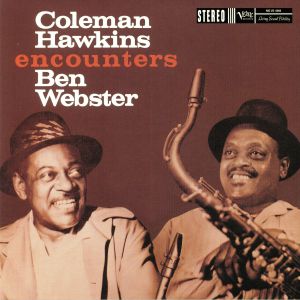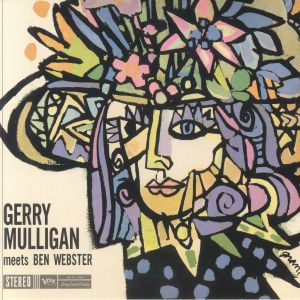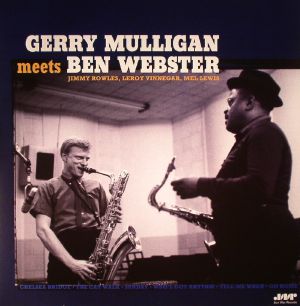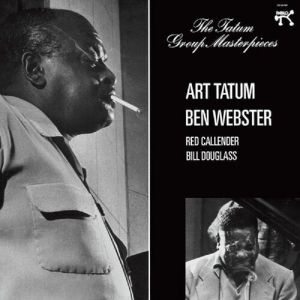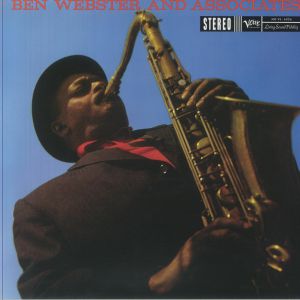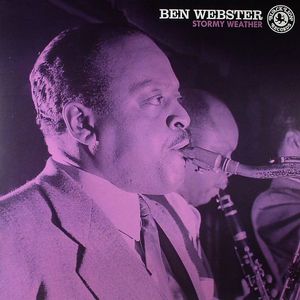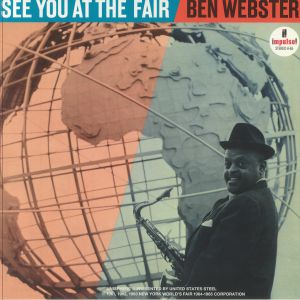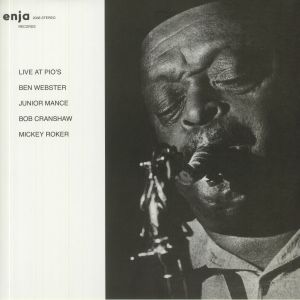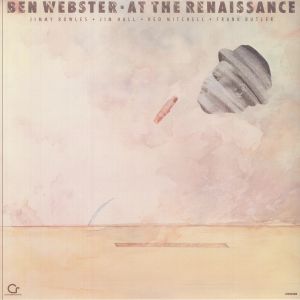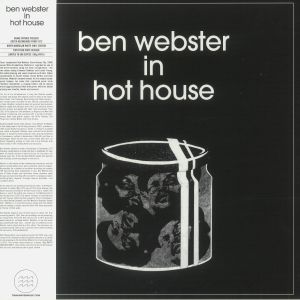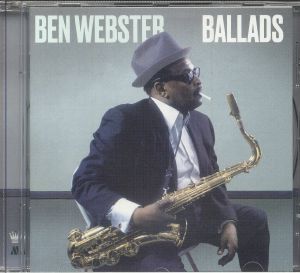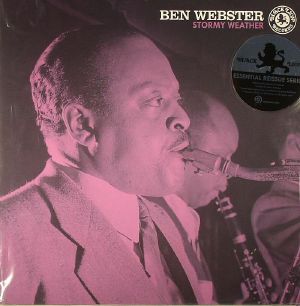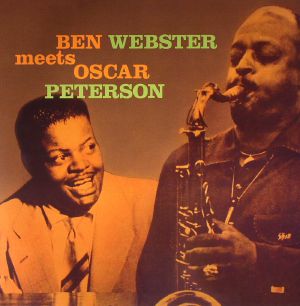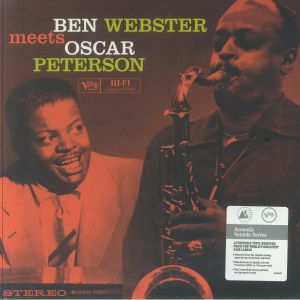Filter
Genre
在庫状況
音楽
アーティスト
リリースタイトル
値段
Back catalogue: All genres
Juno's full catalogue of All genres
アルバム
Coleman Hawkins Encounters Ben Webster (reissue) (heavyweight vinyl LP)
Cat: 770896 3. Rel: 22 Feb 19
Jazz
in stock $26.43
Gerry Mulligan Meets Ben Webster (Acoustic Sounds Series) (gatefold 180 gram vinyl LP)
Cat: 651245 9. Rel: 25 Jul 24
Jazz
Review: Gerry Mulligan and Pepper Adams, baritone saxophonists from the golden age of modern jazz, mastered the deep-toned instrument with distinctive styles. While Adams is celebrated for his hard bop work with Donald Byrd, Mulligan is renowned for his west coast cool jazz innovation. Gerry Mulligan Meets Ben Webster, recorded in 1959, is a standout in Mulligan's series of "meets" albums. Webster, a jazz legend from the swing era, pairs brilliantly with Mulligan's versatile, airy baritone. Their collaboration on this album, backed by the talented rhythm section of Jimmy Rowles, Leroy Vinnegar and Mel Lewis, features inventive solos and memorable melodies. The most acclaimed track, Billy Strayhorn's 'Chelsea Bridge,' features Webster's evocative tenor solos, reminiscent of his days with Duke Ellington. The album evokes the swinging big band era while sounding modern in the jazz world of 1960. As Dave Brubeck noted in the LP's liner notes, Mulligan's music transcends time with taste and respect for jazz idioms.
… Read more in stock $39.92
Gerry Mulligan Meets Ben Webster (remastered) (limited 180 gram audiophile vinyl LP)
Cat: JWR 4531. Rel: 01 Jan 90
Jazz
in stock $16.86
Review: This album recorded by Tatum and Webster in 1956 came just prior to Tatum's passing less than two months later. Revered as a masterpiece, the dynamic interplay between Webster's blend of aggression and lyricism and Tatum's flamboyance and delicacy creates a captivating encounter, with Callendar and Douglass providing impeccable support. Reissued previously by Essential Jazz Classics, this new edition adds bonus tracks from a 1953 Tatum solo session and four numbers from a summit meeting between Webster and Teddy Wilson.The opener sets a languid tempo, diverging from the breakneck pace of many bebop jams, establishing the album's relaxed vibe. And even as later cuts quicken the pace, there's an underlying sense of ease that permeates throughout. Tatum's cascades of notes serve as ornamental accents rather than urgent directives, while Webster, despite the excess reverb of the era, focuses on melody.
… Read more in stock $59.05
Ben Webster & Associates (Acoustic Sounds Series) (gatefold 180 gram vinyl LP)
Cat: 757360 7. Rel: 09 May 25
Jazz
Review: Ben Webster and Associates marked the final collaboration between tenor saxophone legends Ben Webster and Coleman Hawkins, with veteran Budd Johnson joining them. The album was originally released in 1959 and featured a lineup including trumpeter Roy Eldridge, guitarist Les Spann, pianist Jimmy Jones, bassist Ray Brown and drummer Jo Jones. It has many timeless standards like 'Time After Time' and Ellington's 'In a Mellow Tone' along with three original Webster compositions, all of which have been transferred from the original analogue tapes and remastered. The album served somewhat as a tribute to Lester Young, a tenor master from the same era who had died under a month before the session.
… Read more in stock $40.48
in stock $29.80
Review: Ben Webster's See You at the Fair stands as a triumphant farewell to his American recording career before moving to Europe, where his genius would be more appreciated. At the time, Webster was still at the height of his powers, his signature tone both rich and velvety, with an emotional depth that few could match. His interpretation of ballads like 'Someone to Watch Over Me' and 'Over the Rainbow' is breathtaking, as he weaves through these standards with unmatched grace and tenderness, making them definitive versions. The album features a stellar quartet, including post-bop greats Hank Jones on piano and Richard Davis on bass. The opener, 'See You at the Fair', sets an exciting tone with its upbeat blues, showcasing Webster's growling intensity alongside Jones' inventive piano work. On slower tracks like 'Stardust' and Ellington's 'In a Mellow Tone', Webster's lyrical playing creates an intimate, timeless atmosphere, effortlessly capturing the listener's heart. Roger Kellaway, who steps in on the second half of the album, adds a surprising yet delightful twist by playing the harpsichord on a few tracks, including the lively 'Lullaby of Broadway'. What could have been kitschy instead brings a quirky charm, blending seamlessly with Webster's swing. See You at the Fair is a masterclass in tenor saxophone, filled with heartfelt performances that highlight Webster's unique ability to express both joy and melancholy. It's an essential listen, capturing the spirit of a saxophone giant who remains a singular voice in jazz history.
… Read more in stock $39.92
in stock $42.18
Review: Ben Webster's At The Renaissance captures a spellbinding live performance recorded at The Renaissance in Hollywood on Oct 14, 1960. This reissue, part of the Contemporary Records Acoustic Sounds Series, celebrates the timeless brilliance of Webster's tenor saxophone artistry. Accompanied by a stellar ensemble including pianist Jimmy Rowles, guitarist Jim Hall, bassist Red Mitchell, and drummer Frank Butler, Webster delivers a captivating set that showcases his superior and creative form. The album's repertoire offers a delightful variety, from the heartfelt rendition of 'Georgia on My Mind' to the infectious energy of 'Ole Miss Blues.' Webster's rich, emotive tone and masterful improvisation shine throughout, cementing his status as one of the founding emperors of the jazz tenor saxophone. This reissue, mastered AAA by Bernie Grundman from the original analogue tapes and pressed on 180-gram vinyl at Quality Record Pressings, this edition ensures an exceptional listening experience. Presented in a gatefold old-style tip-on jacket by Stoughton Printing, the release pays homage to Webster's legacy with the reverence it deserves.
… Read more in stock $37.68
In Hot House (reissue) (limited 180 gram white vinyl LP with obi-strip)
Cat: TWM 98LITA. Rel: 16 May 23
Jazz
in stock $22.99
in stock $11.81
Stormy Weather (B-STOCK) (180 gram vinyl LP)
Cat: LORG 1064 (B-STOCK). Rel: 01 Jan 90
Jazz
B-STOCK: Sleeve damaged but otherwise in excellent condition
Our Love Is Here To Stay
My Romance
Blues From Herluf
Londonderry Air
Mack The Knife
I Can't Get Started
The Theme
Friskin' The Frog
Stormy Weather
Teach Me Tonight
in stock $36.44
in stock $78.17
in stock $16.86
Ben Webster Meets Oscar Peterson (Acoustic Sounds) (gatefold 180 gram audiophile vinyl LP)
Cat: 656273 4. Rel: 05 Dec 24
Jazz
Review: Ben Webster, a titan of tenor saxophone, solidified his legacy through indelible collaborations, notably in Ben Webster Meets Oscar Peterson. This album showcases Webster's affinity for Peterson, his preferred partner at the piano. Part of Verve's Acoustic Sounds Series, it features meticulously remastered analogue tape transfers on high-quality 180-gram vinyl, presented in deluxe gatefold packaging. With tunes like 'Bye Bye Blackbird' and 'How Deep Is The Ocean,' each note resonates with heartfelt emotion, capturing the intimate interplay between two legends of jazz. A definitive collection for any serious audiophile.
… Read more in stock $41.06

 USD
USD






